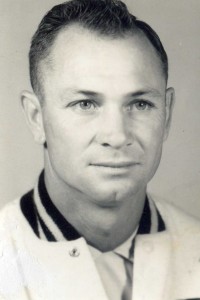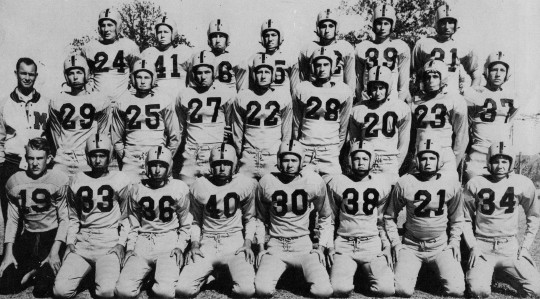He outran them all.
From the woods and swamps around his home in Millry, Alabama to the grass turf at Wildcat Hill, where the Millry Wildcats play their home games…
From a stint in the postwar United States Navy to the gridiron at the Mississippi Southern College…
From the sidelines and dugouts in the rural South to a legacy of influence that will long outlive him…
Nobody ever outran Morris Brown.
Nobody.
And he’d be the first to tell you.
In college they called him “Lightning.” But the people whose lives were most impacted by his teaching, motivation, and personal influence to this day simply call him, “Coach.”
Arriving in Jones County, Mississippi in 1951, Coach inherited 13 players in a football program that had seen four coaches in the previous two years. Painfully shy and untested, but not intimidated in the least, he led Shady Grove and later West Jones High School to a career football record of 145-38-4. Along the way, he collected 10 county championships or Coach of the Year honors.
Coach was first and foremost a teacher. He taught the skills. He taught excellence. He taught sportsmanship. He taught life. (He even taught Social Studies when he had to!) One of the marks of the really good teachers is that current and former students will come back – again and again – for instruction that exceeds life in the classroom. That was Coach.
 Coach was an extraordinary motivator. “He had a way with people like no other,” said Dale and Lynn Holifield. “I know he made each class of students that graduated from Shady Grove feel like their class was his favorite class.” When 6’1”, 140-pound Bill Glen first met Coach, Morris took one look at him and said, “He’s too small to play football, but he is welcome to try out if he wants to.” Two seasons later, Bill Glenn won the team award for Best Defensive Lineman(!). To this day, Bill would tell you that players win awards that coaches help build and shape.
Coach was an extraordinary motivator. “He had a way with people like no other,” said Dale and Lynn Holifield. “I know he made each class of students that graduated from Shady Grove feel like their class was his favorite class.” When 6’1”, 140-pound Bill Glen first met Coach, Morris took one look at him and said, “He’s too small to play football, but he is welcome to try out if he wants to.” Two seasons later, Bill Glenn won the team award for Best Defensive Lineman(!). To this day, Bill would tell you that players win awards that coaches help build and shape.
Talk to any of his former players or students – many of whom have grandchildren of their own today – and one of the phrases you’ll often hear about Coach is that he was a second father. Whether it was a gracious stand-in for students who literally didn’t have a father, or reinforcement for what his students were getting from home, Morris refused to punch a time clock when it came to molding young lives. Teaching and coaching were lifetime, round-the-clock pursuits. And a generation of adults from Jones County would testify that when Morris Brown passed away, they were saying good-bye to a man who was as close as family and as revered as any daddy.
Off the field and off-season, Coach continued to pour into the lives of current and former students. Whether at his fish camp, in the swamps hunting coons, or deer hunting in the woods, Morris built friendships around fun, and took his athletes along for the ride.
He was a people magnet. Students, parents, community members – it didn’t matter. Even beyond his teaching years, Coach never forgot the people whose lives he touched. “He always made you feel special and like you were his favorite,” said Hilder Grace Houston. One of the keys to his success as a relationship builder was that he knew that love and respect were given first, then received. And Coach was beyond generous when it came to giving love and respect. Is it any wonder that he is so revered today?
Influence is what remains after our lives have touched another, either through word, deed, or example. Coach was an influence. At his funeral, Robert Earl Scruggs made this statement:
Coach typed up what he wanted me to say at his funeral. Actually, he didn’t type it up – he just lived it in front of me for the 50 years that I knew him. He was someone who lived their funeral message. How wonderful can that be?
Morris Brown’s greatest legacy – and victory – grew not out of the X’s and O’s of a locker room chalkboard or even his ability to lead students and players to adore him. It grew out of a relationship he had with his Lord and Savior. His life profoundly shaped by the goodness and grace of the Lord Jesus, Coach reflected those values on and off the field. Values like honesty. Patience. Kindness. Vision. Love. In Coach’s life, “Victory in Jesus” wasn’t a song to sing in church; it was a life to live in the trenches.
When someone spends a lifetime investing his life in the lives of others, those lives sit up and pay attention. Coach Lightning was that kind of investor. He was a memory maker, and lived to see the fruit of his labor for about as long as any of us can expect. But like the greatest of LifeVestors, his legacy lives on, well past his lifetime.
Perhaps the greatest expression of that came from Wendell Gavin, one of those first 13 Shady Grove players. After Coach came to visit him and his two brothers for the first time, one of them said, “I wonder how long he will be around.”
“Well, 58 years later,” Wendell said, “the Lord took him. We couldn’t get rid of him.”
I can’t imagine anybody ever wanting to.
(from the forthcoming book, Coach Lightning)

Great stuff. Makes me want to know more about “Coach Lightning.”
Coach was know to me as Uncle Morris. My Mother was his sister Myra and I have never seen a family love each other as this family did. All of the love came from their parents, Papa’s sense of humor and Mama Brown’s example of how to live real life. Until the last (Uncle Morris) of the family left this world that love was always with us and sustains to this day. It was easy to love him because we all knew that he loved us. He is worth knowing !
Do you have a spam issue on this blog; I also am a blogger, and I was wondering your situation; many of us have
developed some nice methods and we are looking to exchange techniques
with other folks, why not shoot me an email if interested.
search engine´s last blog post ..search engine
Lovely site! I am loving it!! Will come back again. I am taking your feeds also.
Comments on this entry are closed.
{ 1 trackback }